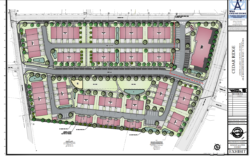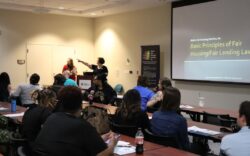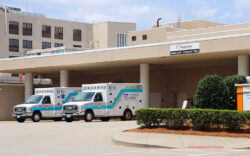The Athens-Clarke County Commission voted last week to provide $4.75 million in direct relief to the Athens community using funding from the coronavirus stimulus package passed by Congress in March.
Federal requirements that this funding be routed through the state government have delayed the money’s arrival in Athens, but now that it’s here, commissioners want to make the most of it. Athens’ share for this phase of the stimulus is $6.64 million. However, $1.99 million of that must be spent before a fast-approaching Sept. 1 deadline. Therefore, most of this part will be used to reimburse the ACC government for a list of COVID-19 expenses already on the books, which is possibly the only way to spend $1.99 million so quickly.
The ACC Manager’s office was hoping to keep $1.2 million of the remaining amount to defray the cost of certain capital expenses, such new radios, vehicles and a generator at the fire station on College Avenue. Manager Blaine Williams’ fiscally conservative plan would have saved the taxpayers money while still providing $3.96 million for community relief through small business loans and food assistance. But the commission had other plans.
Commissioner Mike Hamby drafted an alternate proposal to expand the amount given for community relief and to shrink the amount kept by the local government for capital projects. His proposal will provide businesses grants instead of loans, pay the fares of all Athens Transit riders for the rest of the year and fund an array of nonprofits that help low-income people. Commissioners Ovita Thornton, Andy Herod, Allison Wright and Tim Denson were all listed as co-authors of the proposal, and it was supported by the rest of the commission.
However, ACC Attorney Judd Drake expressed concern about the plan’s legality and asked for a week’s delay so he could do more research. Hamby reacted angrily. “If it’s so hard for us to figure out ways to get the help into the community’s hands, then we’ve got a problem,” he said.
Stimulus funding comes from the federal government and is not subject to the Georgia constitution’s gratuities clause restricting local governments from giving money to businesses directly—or so Hamby hopes. He pointed to Cobb County, which had already handed out money in similar ways, and demanded a vote on his proposal that night.
Other commissioners also seemed frustrated by the slow rollout of the financial assistance package and agreed with Hamby. “Landlords are already calling the courts asking if they can evict now. We need to be more proactive,” Thornton said.
A final request from Commissioner Melissa Link to purchase two COVID-19 testing machines for local clinics was included in the proposal before the vote, which passed unanimously. Even so, the commission will have to revisit the issue next week to hear Drake’s final legal assessment and pass a related resolution.
The commission also voted to help struggling restaurants in Athens by starting a “parklet” pilot program. This would allow restaurants to set up outdoor dining areas in some of the empty parking spaces downtown, letting them expand their seating options. Restaurants are restricted to 35% of their normal capacity during the COVID-19 pandemic due to an executive order signed by Gov. Brian Kemp. Since the likelihood of catching coronavirus is 20 times lower in open-air spaces than indoors, diners these days may prefer getting some fresh air while eating or enjoying a glass of wine.
If the parklets turn out to be popular, it might stick around even after the pandemic. “This is something that I would have liked to have seen on the streets of downtown Athens years ago,” Link said. The pilot program will run for 100 days at first. Then, commissioners and staff will consider if they’d like to make it permanent.
For now, all commissioners agreed with the basics of the plan, but had a sharp disagreement on a few of the details. For example, Link wanted the program to be available to bars as well as restaurants, but only for those businesses following social distancing regulations to the letter. Other commissioners had concerns that parklets for some bars might devolve into out-of-bounds street parties at night, so Link’s proposal was not voted on.
The original parklet proposal passed 5–4 with one amendment. Originally, fees of up to $20 per day would be charged for each parking space, but Denson thought this was “against the spirit” of providing assistance to struggling restaurants. During the 100 day trial period, there will now be no charge for the program.
Like what you just read? Support Flagpole by making a donation today. Every dollar you give helps fund our ongoing mission to provide Athens with quality, independent journalism.










